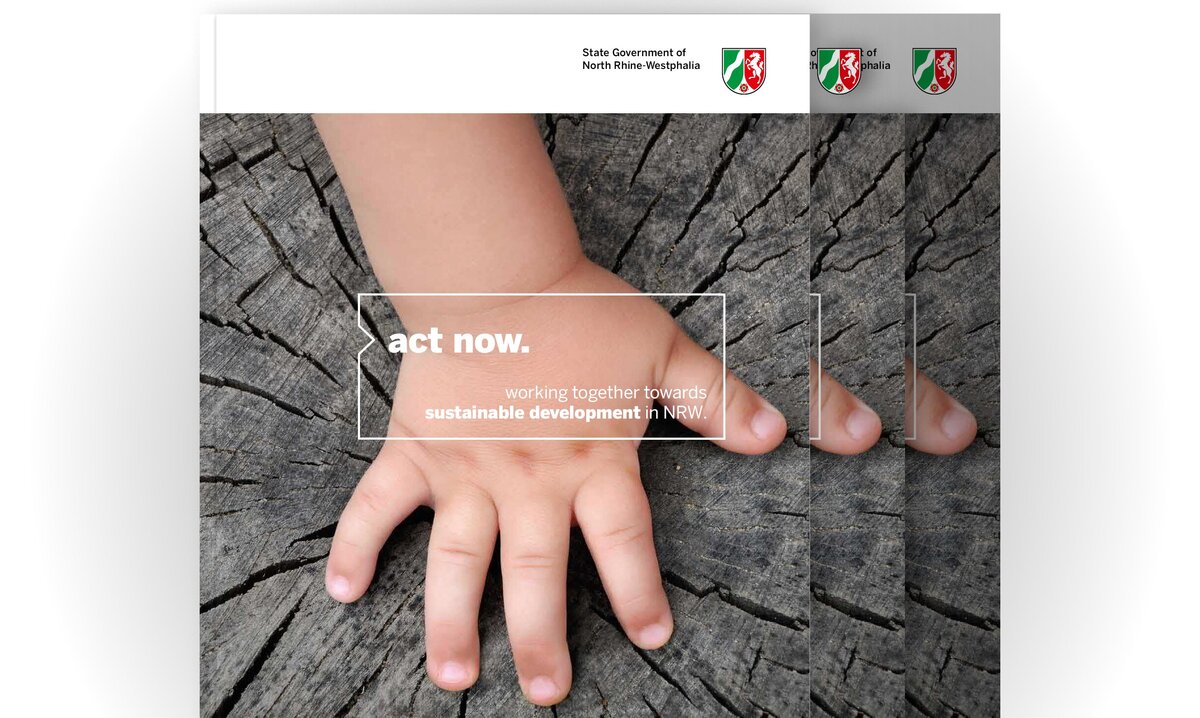NRW Sustainability Strategy 2016
The first NRW sustainability strategy was adopted in June 2016 with the title “Act now – working together towards sustainable development in NRW”. The participation of various stakeholders was a key factor during the extensive consultation process. In 2020, the strategy was updated and further developed.

Extensive consultation and preparatory work were undertaken before the adoption of the first NRW sustainability strategy. This began in June 2014, ahead of the implementation of the UN’s 2030 Agenda in September 2015. Rather than being restricted to the UN’s 17 Sustainable Development Goals (SDGs), the NRW strategy 2016 focused on seven cross-departmental priority areas which are central to the implementation of its sustainability strategy. These are: a Climate Protection Plan, a Green Economy Strategy, a Biodiversity Strategy, Sustainable financial policy, the sustainable development of urban areas and neighbourhoods, demographic change and the provision of suitable neighbourhoods for the elderly, as well as the state-wide initiative “NRW hält zusammen – für ein Leben ohne Armut und Ausgrenzung” [“Together in NRW for a life without poverty and marginalisation”].
The clear goal of the NRW sustainability strategy 2016 was however to contribute to the implementation of the 2030 Agenda for Sustainable Development and the 17 Sustainable Development Goals (SDGs) adopted by the United Nations.
In addition, the strategy has defined 19 central fields of action for sustainable development which cover the entire spectrum of state policies. These are:
- Climate protection and energy transition
- Sustainable economy
- Natural resource Protection: biodiversity, forests, water, land/soil, air and environment & health
- Demographic change
- Social cohesion and participation
- Decent work—fair work
- Integration
- Sustainable financial policy
- Sustainable urban development
- Sustainable mobility
- Sustainable consumption/sustainable lifestyles
- Land cultivation
- Health
- One-world policy / European and international dimension
- Gender equality
- Inclusion
- Sustainable municipalities (local agenda)
- Civic involvement / participation
- Education and science
The first sustainability strategy for North Rhine-Westphalia was organised into 19 central fields of action and 7 cross-departmental focal areas.
Participation and consultation were vital factors in developing the 2016 strategy. This process began in June 2014 with the state government’s adoption of the key issue paper “Towards a sustainability strategy for North Rhine-Westphalia”. This was followed by offline and online rounds of consultation.
First, economic, scientific and civil society stakeholders in the state were invited to give their feedback and make suggestions on the paper. This led to a period of deliberation and commentary via written statements in conjunction with the 3rd NRW Sustainability Conference held in Mülheim/Ruhr on 17 November 2014. The collated comments were then comprehensively analysed and evaluated and the results summarised in a published report.
Based on this consultation and the summary report, the interdepartmental working group on the sustainability strategy” (“IMAG Sustainability Strategy”) compiled the first draft of the NRW sustainability strategy which was then approved by the cabinet in its meeting on 29 September 2015. Subsequently, between the end of October and November 2015, citizens, municipalities, civil society organisations and scientific and economic stakeholders were given time to make suggestions for additions and changes. The state government assessed this feedback alongside outcomes from the 4th NRW Sustainability Conference (held in Düsseldorf on 28 October 2015) and input from other participation forums, and incorporated everything into the draft strategy. Finally, the first Sustainability Strategy of the State of North Rhine-Westphalia was adopted in June 2016.
Sustainability targets to be reached by 2030 were defined for all 19 fields of action and, where possible, quantities and deadlines were specified. The development of the strategy’s 70 indicators included provision of ongoing progress reports and transparency.
The state government of North Rhine-Westphalia updated its first NRW sustainability strategy in 2020. This updated strategy is closely aligned with Germany’s Sustainability Strategy as well as the United Nations’ 2030 Agenda and its 17 Sustainable Development Goals (SDGs). In addition, the 2020 Sustainability Strategy is accompanied by an indicator report and an indicator website which continuously provides data on the development of the sustainable goals and records concrete indicators of its success.


